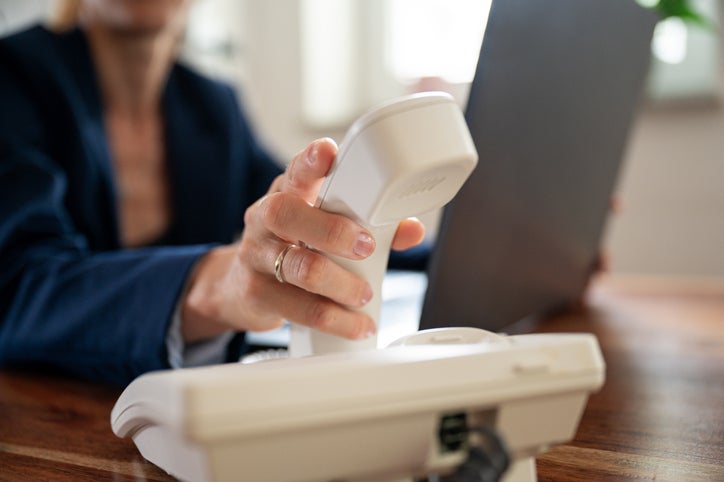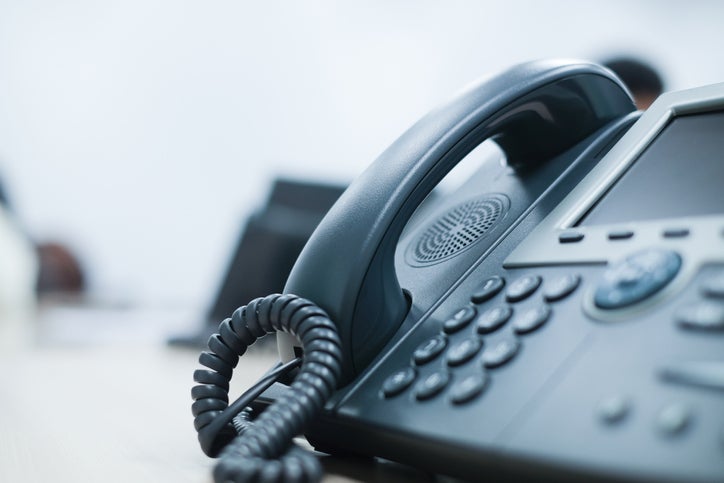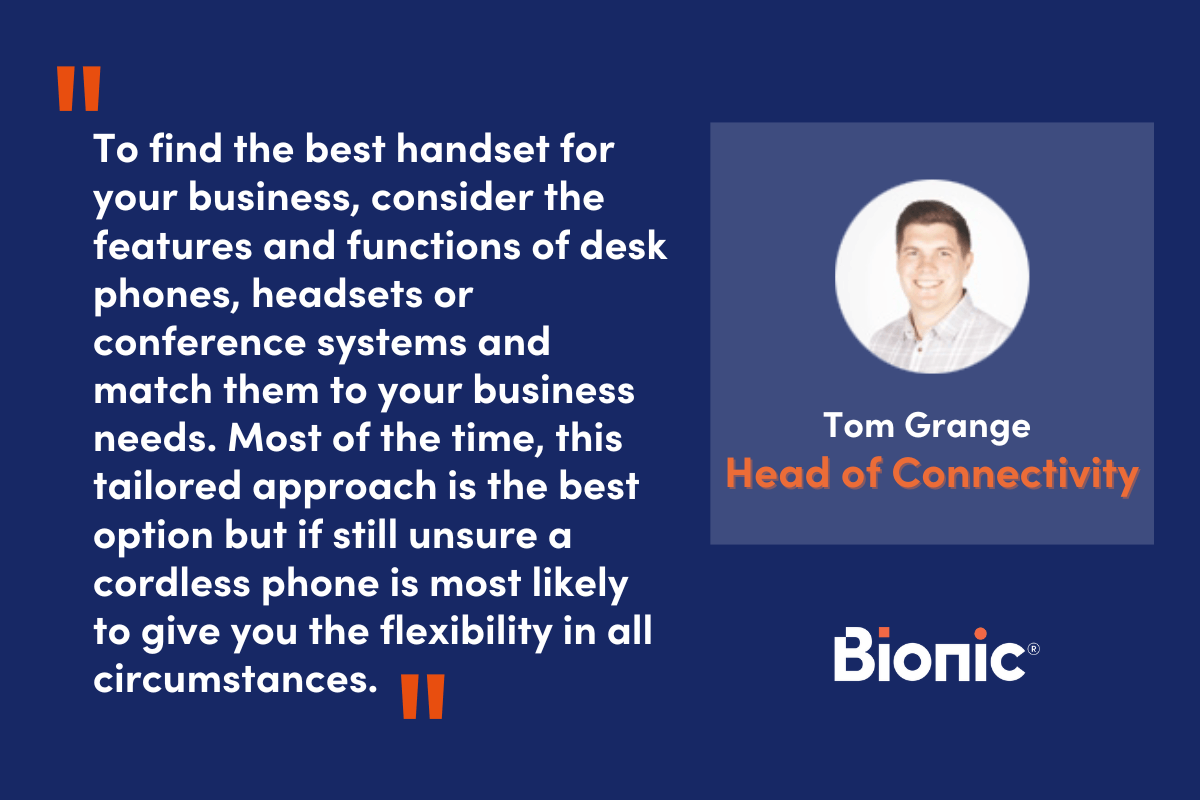What handset should I get for my phone system?
Good communication is key for all businesses. Whether you're keeping up with your own team or checking in with your customers, having professional tools like handsets and phone systems can help make life easier.
86% of employees and business owners say that poor communication and collaboration is the leading cause of business failure. So it’s not surprising that teams who have good communication say that their productivity increases by 25% at work.
Professional handsets and headsets are great for quick and easy calling, meetings and automating processes that save time with a touch of a button, so you can be confident your business operations are running smoothly.
But what handsets are best for your business? We’ve broken down everything you need to know about business handsets and headsets, so you have all the details to make the best choice on choosing a model for your business phone system.

30-second summary
- A phone handset is a piece of hardware that uses a listener that you pick up from a receiver; while a headset is a piece of headgear you wear on your head that leaves you hands-free to multitask.
- Handsets and headsets are great for effective communication in small businesses and newer models even integrate with VoIP systems. Features of handsets normally include personalised voicemail, call redirection, conference calling, call logging and barring.
- There are three main types of business handsets: desk phones, cordless phones and conference phones. The type of handset you need depends on the individual size and needs of your business.
- If you have existing on-premise PBX telephone systems or self-hosted telephone systems then desk phones, cordless phones and conference phones can be integrated.
- Bionic can help you find the right hardware for your business communications, taking into consideration any existing phone systems.
What is a telephone handset?
A telephone headset is a phone system that includes a separate area for both speaking and listening. You can think of it as an old-school phone, one with a handheld listener that you hold up to your ear and speak into to make and receive calls.
These days most modern businesses use electronic handsets for speed and efficiency. This is because telephone handsets come in all shapes and sizes and can work with landlines or integrate with VoIP systems in office workplaces.
What are the benefits of handsets for small businesses?
Modern handsets are great for small businesses because they make communication easy. This is partly because of the functions that can be set up:
- Personalised voicemail - Voicemail lets callers leave messages when you can’t get to the phone. A properly recorded work voicemail makes you come across as a legitimate, professional business that customers are likely to trust - even if they can’t get hold of you.
- Call redirection - This feature lets you push calls to another phone number within your business, and it’s great for remote workers who may need to transfer to another colleague.
Imagine if you have employees working in a cafe and you, as the owner, are working on admin from home. If a supplier or partner calls your shop and you aren’t there, the employee working can transfer the caller to your phone at home so you can still take the call. This can easily be done on most business handset devices. To find out more about keeping your employees connected, check out our guide to remote working.
- Conference calling - With an increase in working from home, the need for having group meetings over the phone is increasing. Modern phone handsets include conference calling options, which let two or more people have a call together and have meetings allowing for teamwork and collaboration.
- Call Logging - This is basically a way of keeping track of your calls. It notes down the calls you’re receiving, the time of the calls and the phone numbers involved for your personal records. This is great for monitoring customer service or sales teams where you need to keep records or monitor customer calls to make sure the quality of your service is up to the standard you expect.
- Call Barring - No one wants spam callers or phishing attempts coming through on their work phone line. Call barring allows you to block unwanted numbers that distract you from serving your customers. You can also limit the outgoing calls your employees make - so they can’t rack up unwanted phone bills.
- Fewer distractions - Handsets can be better than smartphones in the workplace because there is less chance of your employees getting distracted. Modern smartphones are designed for engagement, with endless apps and notifications. If you have a modern office headset just for calls - your workplace productivity may actually go up.
- Integrated with VoIP - VoIP-compatible handsets allow organisations to make calls through a business broadband connection. Essentially, you can use phone hardware and connect it to the internet instead of a standard phone line. Although these handsets use an internet connection, they still have the usual business phone functions: programmable keys; contact and call storing capability; speakerphones; call logging and call transfers etc.
What’s the difference between a handset and a headset?
The clue is really in the name. A handset is a device you use like a traditional phone; you pick it up and hold it in your hand from a receiver device.
A headset is worn on your head and includes headphones and a microphone you listen and speak into.
Both are useful depending on what your business needs. We’ve broken down the features of each device for ease.
Handsets:

- Handheld - As the name suggests, you pick up the device in your hand and hold it to your ear when you make a call.
- Corded or cordless - Handsets come cordless or corded and are sometimes attached to a receiver that sits on a desk.
- Permanent - Typical handsets need to be plugged in and connected to a phone line or VoIP system and are designed to be kept in a permanent place. A cordless phone allows the receiver to walk and talk while a wired phone means the caller must be an arm's length away from the receiver.
- Desk friendly - Handsets are ideal for office work. They can sit on desks and link up to VoIP systems and integrated phone systems. They work best in environments where making and receiving calls is not the primary job function, but occasional calls are needed.
- Mobile smartphones - Mobile phones are also cordless handsets, and just like your personal smartphone, you can use these specifically for business activities if you have a cloud-based phone system or if you prefer a modern business feel.
Handsets are ideal for small to medium businesses that have reception areas, office desks or back offices that need a main phone line for occasionally calling clients or suppliers.
Headsets:

- Headwear - A headset is a hardware device that sits on your head that connects to a telephone or computer. This then allows the user to make calls.
- Portable - Headsets are lightweight and can be plugged into a computer system with a USB or Aux cable. Cordless headsets can connect to phone systems via Bluetooth, which means employees are free to walk around while chatting away, unlike corded handsets.
- ‘Hands-free’ - One of the major advantages of a headset is that you can keep your hands free while on the phone. This is great for multitasking and note-making, especially if you are talking to customers and might need to jot something down. Some headsets have noise-cancelling features, which is great if your employees are working in a loud environment, so they can still hear clearly on the phone.
How to choose the right handset for your business
Figuring out what handsets you need to run your business doesn’t need to be complicated. Our experts can advise on the specifics - but for ease, here’s a breakdown of the types of handsets available and their main features:
Types of business handsets
There are three main types of business handsets on the market:
- Desk Phones - This is a type of handset that is wired and sits on a desk or table, like a traditional office phone. A desk phone is ideal if you have a reception desk or a back office where you need a simple business phone line for occasional use.
- Cordless Phones - This type of handset is cordless and portable. It’s hands-free and connected to a ‘base’, which charges it back up when you aren’t using it. These phones are great if you prefer to ‘walk and talk’ around your premises.
- Conference Phones - This is a special type of handset designed for telephone conference calls - where multiple people dial in to listen or chat as part of a group. Conference phones are a good option if you have employee meetings or client meetings that involve more than two people on a regular basis.

Handset features and functions
Here is a breakdown of the types of typical handsets suitable for small to medium businesses, with key features and functions:
| Handset Type | Handset Model | Key Features | Key Functions |
Desk Phone | Polycom 150 | - 2 lines - Dual Ethernet port - 2.5” grayscale display - USB & headset ports - Desktop or wall mounted *Read the Polycom 150 User guide. | - Incoming and outgoing calling - Call logging, redirection & barring - 3-way conference calls - Speakerphone - VoIP integration |
Cordless Phone | Yealink W52P | - 4 lines - Cordless - Ethernet port - 1.8” grayscale display - 10-hour talk time - Eco features *Read the Yealink Datasheet. | - Incoming and outgoing calling - Call logging, redirection & barring - 3-way conference calls - Speakerphone - Hands-free - VoIP integration |
Conference Phone | Polycom Trio 8500 | - 3 lines - Single ethernet - USB ports - Bluetooth - 4” colour display - Echo cancellation & noise reduction *Read the Polycom Trio 8500 User Guide | - Video & audio calling - Video call recording with pause & play - Calendar and App integration - Speakerphone - Hands-free - VoIP integration |
At Bionic we work with providers that offer all of these phone solutions and more for business. Feel free to speak to one of our experts for more guidance.
How to choose the best handset for your phone system
Making sure you have the best handset for your business phone systems depends on a few factors, but mostly on what technology you are using. Below we’ve matched phone systems to the best business handsets.
| Business Phone System | Suitable Handsets |
| Cloud-based | Conference phones (if actual hardware is needed) |
| On-premise PBX telephone system | Desk phones and Cordless phones |
| Self-hosted telephone system | Conference phones |
For example, if you own a remote start-up business and use a fully cloud-based calling system, you might not need any physical hardware as the majority of calls will be made and received through internet apps using laptops or smartphones. But, if you need a physical line, conference phones are the best option as they have video calling capabilities.
On the other hand, if you own a coffee shop or physical premises, an ‘on-premise PBX telephone system’ might be a better choice as you’ll have physical handsets to use.
Not sure what phone system you have or you need for your business? Read our guide to choosing a business phone system, where we break down all the options so you can find the right one that fits your needs. Or speak to one of our experts and compare the best digital phone systems available.
Business telephone FAQs
If you're still unsure about the handsets and tech on offer, we might have the answers you're looking for in our FAQs.
Do offices still use desk phones?
Whether you need office desk phones really depends on the type of business you have. If you have remote workers that need to keep in contact, then desk phones probably aren’t the best option. Instead, a cloud-based system with smartphones and specialised apps like VoiceEdge for business calls might be better.
Desk phones are great for small businesses with reception desks and back offices where you need a mainline for customer contact. There are also suitable for small office areas where customer calls are not the main focus of the job.
Do businesses still use landlines?
70% of UK businesses still use a phone landline. Are you one of them? In 2025 landlines will become redundant and no longer work. This means you will have to upgrade to a digital solution with a digital business phone line or business VoIP system. Don’t get left behind and get ahead of the switch with our guide on everything you need to know about the 2025 digital switchover.
VoIP systems might sound scary - but they are just modern ways of communicating. They are a good choice for small businesses, and you can easily adjust the size of them if you want to grow your business. Not sure about switching to a VOIP system? See our guide on the difference between business VoIP vs business landline.
Does my business need a landline?
Every business needs a main phone line. Not just for calling but to look trustworthy and credible. If you’re thinking of installing a landline at your business premises, it’s probably worth looking into VoIP. Having a VoIP system will make sure that your main customer phone number will still work after landlines are turned off in 2025.
How can Bionic support my business?
At Bionic, our experts learn the ‘ins and outs’ of your business in order to give you a personalised quote to suit you. Whether that includes a VoIP system with handsets and or headsets. Get in touch with one of our specialists today to talk through the details.
Starting a new business? Or want to switch business phone providers? Find out how Bionic can help you set up or switch your business phone line.








